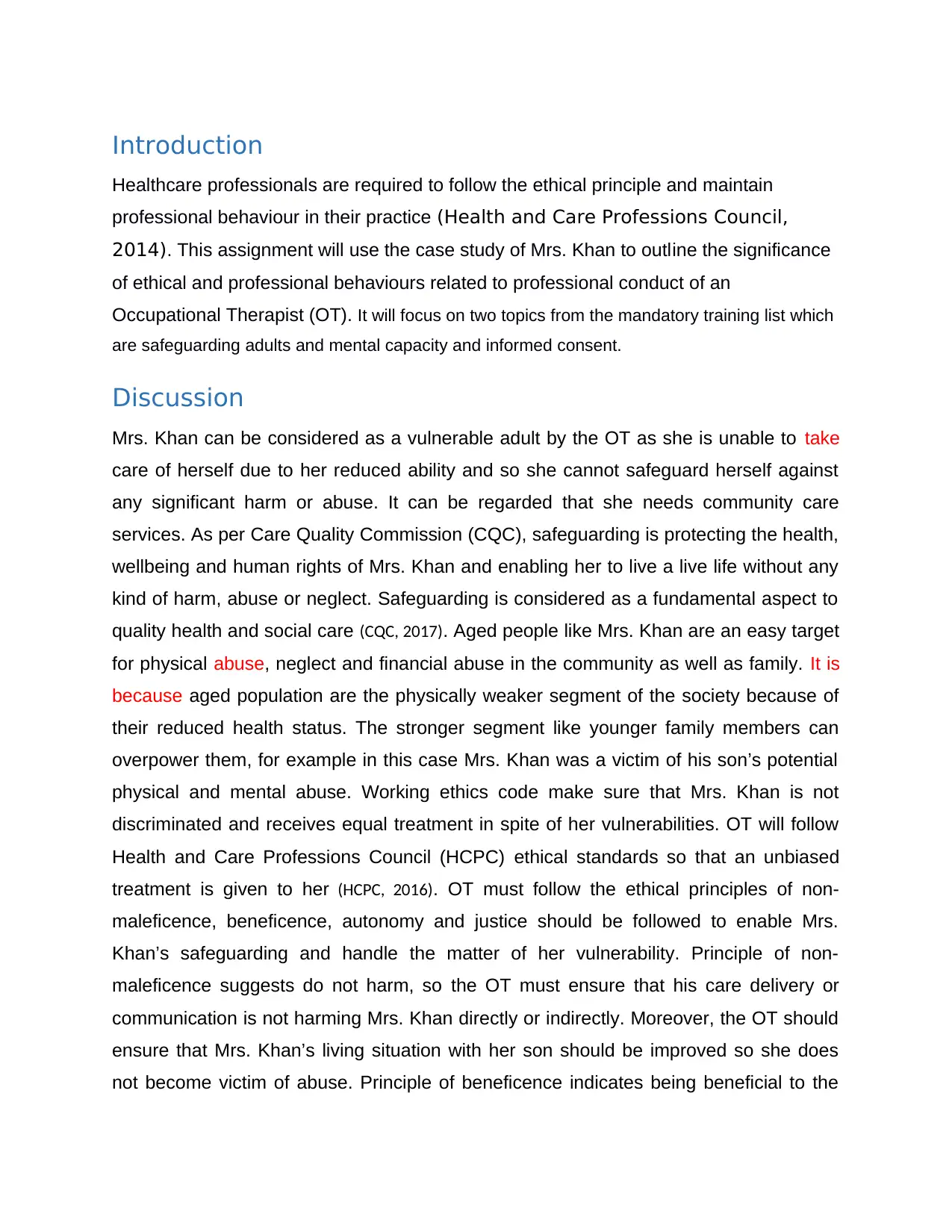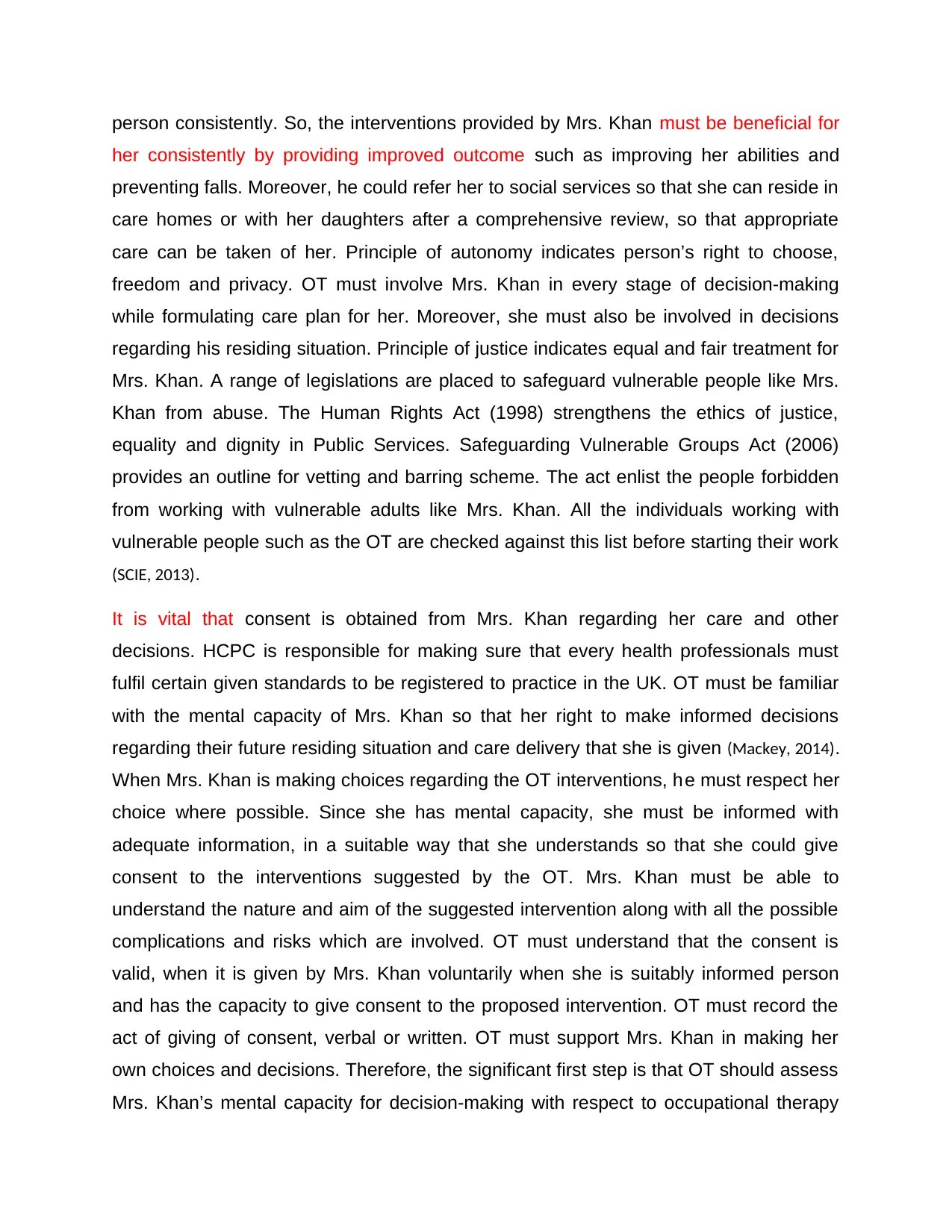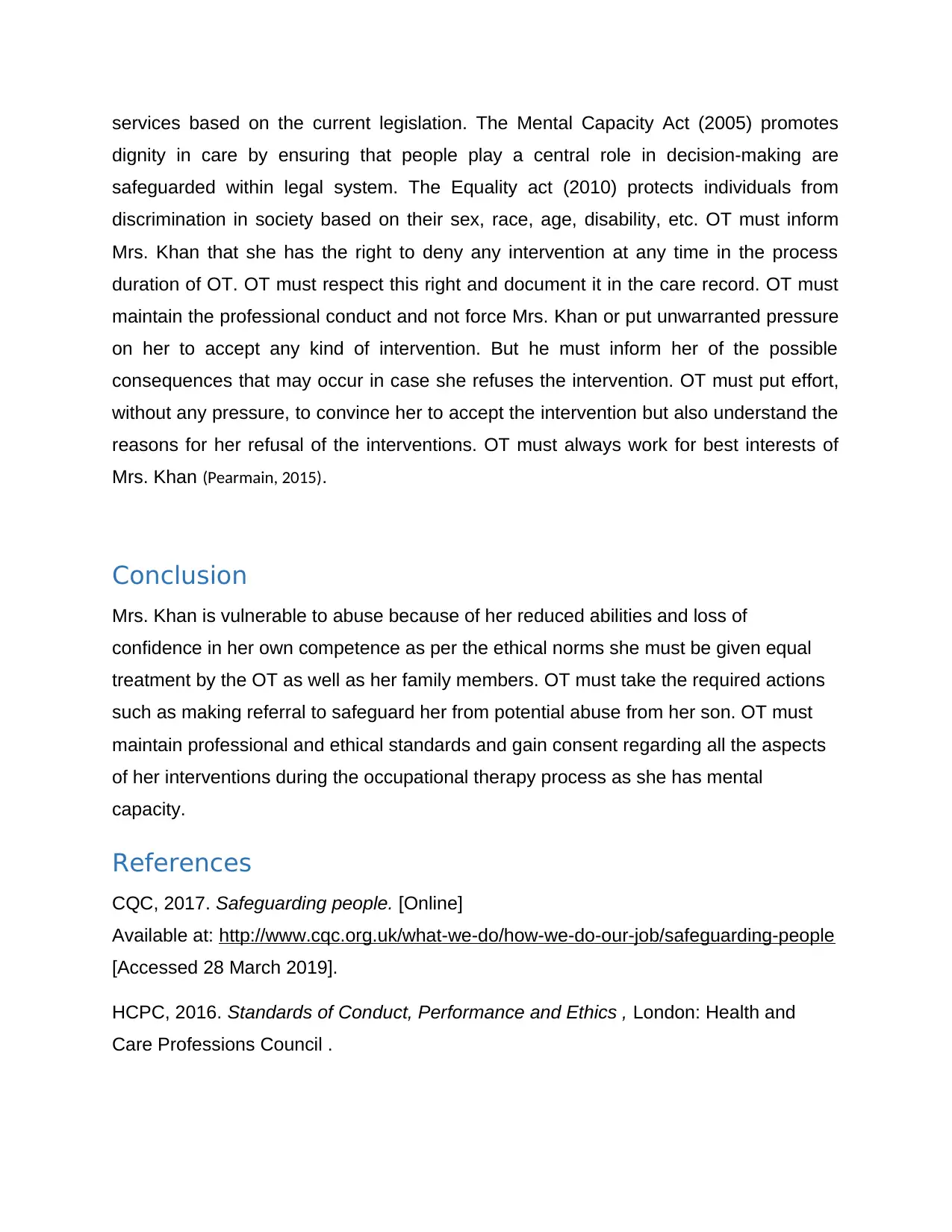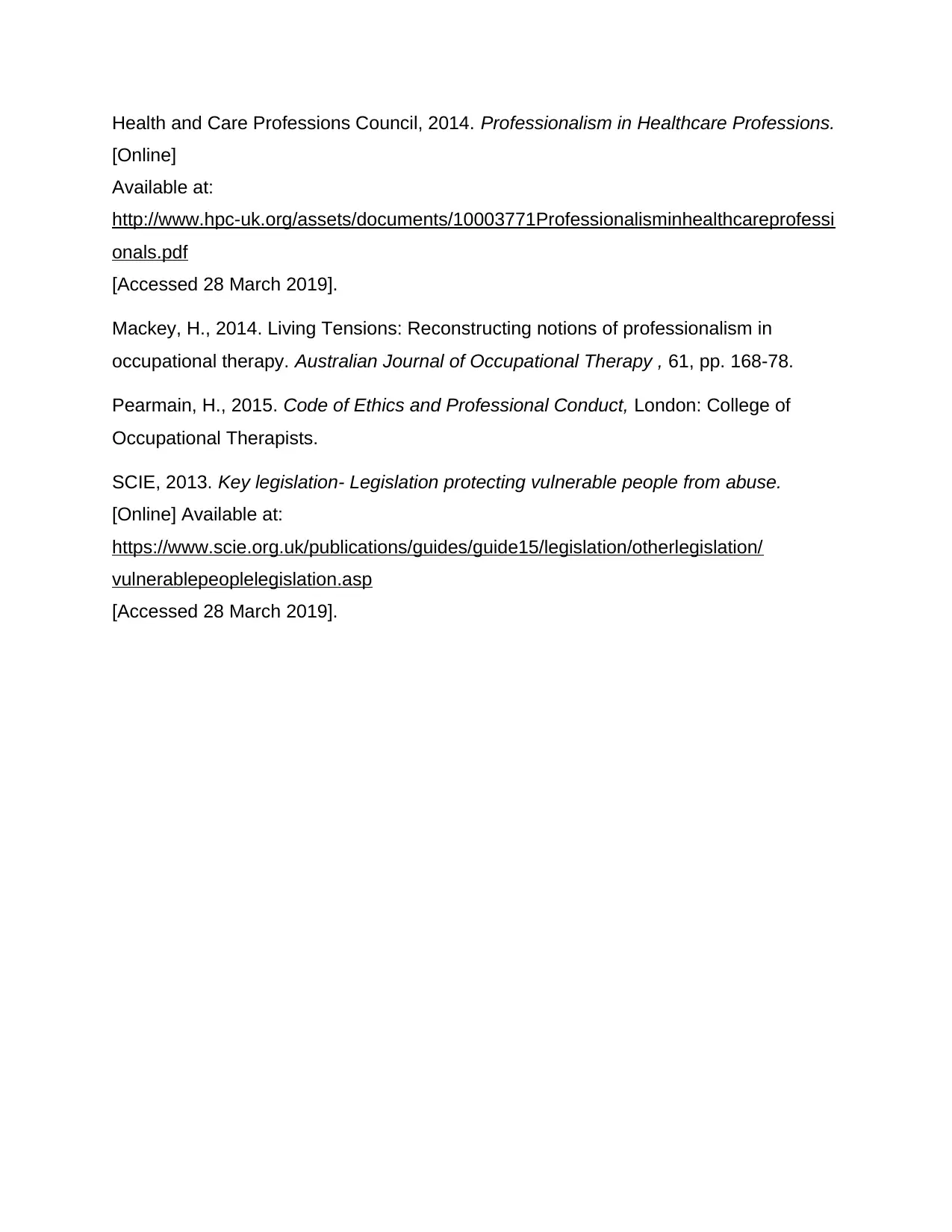Occupational Therapy: Ethical and Professionalism in Healthcare Report
VerifiedAdded on 2023/04/20
|6
|1316
|186
Report
AI Summary
This report examines the ethical and professional conduct of an Occupational Therapist (OT) using the case study of Mrs. Khan, a vulnerable adult. It delves into the significance of ethical principles, including nonmaleficence, beneficence, autonomy, and justice, in safeguarding Mrs. Khan from potential abuse and ensuring her well-being. The report emphasizes the importance of adhering to the Health and Care Professions Council (HCPC) ethical standards and obtaining informed consent, considering Mrs. Khan's mental capacity as per the Mental Capacity Act (2005). It outlines the OT's responsibilities in promoting Mrs. Khan's autonomy, respecting her choices, and ensuring equal treatment while also addressing the relevant legislations like the Human Rights Act (1998) and the Safeguarding Vulnerable Groups Act (2006). The report concludes by highlighting the OT's role in advocating for Mrs. Khan's best interests and maintaining professional conduct throughout the occupational therapy process.

Component 1: COURSEWORK
Paraphrase This Document
Need a fresh take? Get an instant paraphrase of this document with our AI Paraphraser

Contents
Introduction......................................................................................................................................3
Discussion........................................................................................................................................3
Conclusion.......................................................................................................................................5
References........................................................................................................................................5
Introduction......................................................................................................................................3
Discussion........................................................................................................................................3
Conclusion.......................................................................................................................................5
References........................................................................................................................................5

Introduction
Healthcare professionals are required to follow the ethical principle and maintain
professional behaviour in their practice (Health and Care Professions Council,
2014). This assignment will use the case study of Mrs. Khan to outline the significance
of ethical and professional behaviours related to professional conduct of an
Occupational Therapist (OT). It will focus on two topics from the mandatory training list which
are safeguarding adults and mental capacity and informed consent.
Discussion
Mrs. Khan can be considered as a vulnerable adult by the OT as she is unable to take
care of herself due to her reduced ability and so she cannot safeguard herself against
any significant harm or abuse. It can be regarded that she needs community care
services. As per Care Quality Commission (CQC), safeguarding is protecting the health,
wellbeing and human rights of Mrs. Khan and enabling her to live a live life without any
kind of harm, abuse or neglect. Safeguarding is considered as a fundamental aspect to
quality health and social care (CQC, 2017). Aged people like Mrs. Khan are an easy target
for physical abuse, neglect and financial abuse in the community as well as family. It is
because aged population are the physically weaker segment of the society because of
their reduced health status. The stronger segment like younger family members can
overpower them, for example in this case Mrs. Khan was a victim of his son’s potential
physical and mental abuse. Working ethics code make sure that Mrs. Khan is not
discriminated and receives equal treatment in spite of her vulnerabilities. OT will follow
Health and Care Professions Council (HCPC) ethical standards so that an unbiased
treatment is given to her (HCPC, 2016). OT must follow the ethical principles of non-
maleficence, beneficence, autonomy and justice should be followed to enable Mrs.
Khan’s safeguarding and handle the matter of her vulnerability. Principle of non-
maleficence suggests do not harm, so the OT must ensure that his care delivery or
communication is not harming Mrs. Khan directly or indirectly. Moreover, the OT should
ensure that Mrs. Khan’s living situation with her son should be improved so she does
not become victim of abuse. Principle of beneficence indicates being beneficial to the
Healthcare professionals are required to follow the ethical principle and maintain
professional behaviour in their practice (Health and Care Professions Council,
2014). This assignment will use the case study of Mrs. Khan to outline the significance
of ethical and professional behaviours related to professional conduct of an
Occupational Therapist (OT). It will focus on two topics from the mandatory training list which
are safeguarding adults and mental capacity and informed consent.
Discussion
Mrs. Khan can be considered as a vulnerable adult by the OT as she is unable to take
care of herself due to her reduced ability and so she cannot safeguard herself against
any significant harm or abuse. It can be regarded that she needs community care
services. As per Care Quality Commission (CQC), safeguarding is protecting the health,
wellbeing and human rights of Mrs. Khan and enabling her to live a live life without any
kind of harm, abuse or neglect. Safeguarding is considered as a fundamental aspect to
quality health and social care (CQC, 2017). Aged people like Mrs. Khan are an easy target
for physical abuse, neglect and financial abuse in the community as well as family. It is
because aged population are the physically weaker segment of the society because of
their reduced health status. The stronger segment like younger family members can
overpower them, for example in this case Mrs. Khan was a victim of his son’s potential
physical and mental abuse. Working ethics code make sure that Mrs. Khan is not
discriminated and receives equal treatment in spite of her vulnerabilities. OT will follow
Health and Care Professions Council (HCPC) ethical standards so that an unbiased
treatment is given to her (HCPC, 2016). OT must follow the ethical principles of non-
maleficence, beneficence, autonomy and justice should be followed to enable Mrs.
Khan’s safeguarding and handle the matter of her vulnerability. Principle of non-
maleficence suggests do not harm, so the OT must ensure that his care delivery or
communication is not harming Mrs. Khan directly or indirectly. Moreover, the OT should
ensure that Mrs. Khan’s living situation with her son should be improved so she does
not become victim of abuse. Principle of beneficence indicates being beneficial to the
⊘ This is a preview!⊘
Do you want full access?
Subscribe today to unlock all pages.

Trusted by 1+ million students worldwide

person consistently. So, the interventions provided by Mrs. Khan must be beneficial for
her consistently by providing improved outcome such as improving her abilities and
preventing falls. Moreover, he could refer her to social services so that she can reside in
care homes or with her daughters after a comprehensive review, so that appropriate
care can be taken of her. Principle of autonomy indicates person’s right to choose,
freedom and privacy. OT must involve Mrs. Khan in every stage of decision-making
while formulating care plan for her. Moreover, she must also be involved in decisions
regarding his residing situation. Principle of justice indicates equal and fair treatment for
Mrs. Khan. A range of legislations are placed to safeguard vulnerable people like Mrs.
Khan from abuse. The Human Rights Act (1998) strengthens the ethics of justice,
equality and dignity in Public Services. Safeguarding Vulnerable Groups Act (2006)
provides an outline for vetting and barring scheme. The act enlist the people forbidden
from working with vulnerable adults like Mrs. Khan. All the individuals working with
vulnerable people such as the OT are checked against this list before starting their work
(SCIE, 2013).
It is vital that consent is obtained from Mrs. Khan regarding her care and other
decisions. HCPC is responsible for making sure that every health professionals must
fulfil certain given standards to be registered to practice in the UK. OT must be familiar
with the mental capacity of Mrs. Khan so that her right to make informed decisions
regarding their future residing situation and care delivery that she is given (Mackey, 2014).
When Mrs. Khan is making choices regarding the OT interventions, he must respect her
choice where possible. Since she has mental capacity, she must be informed with
adequate information, in a suitable way that she understands so that she could give
consent to the interventions suggested by the OT. Mrs. Khan must be able to
understand the nature and aim of the suggested intervention along with all the possible
complications and risks which are involved. OT must understand that the consent is
valid, when it is given by Mrs. Khan voluntarily when she is suitably informed person
and has the capacity to give consent to the proposed intervention. OT must record the
act of giving of consent, verbal or written. OT must support Mrs. Khan in making her
own choices and decisions. Therefore, the significant first step is that OT should assess
Mrs. Khan’s mental capacity for decision-making with respect to occupational therapy
her consistently by providing improved outcome such as improving her abilities and
preventing falls. Moreover, he could refer her to social services so that she can reside in
care homes or with her daughters after a comprehensive review, so that appropriate
care can be taken of her. Principle of autonomy indicates person’s right to choose,
freedom and privacy. OT must involve Mrs. Khan in every stage of decision-making
while formulating care plan for her. Moreover, she must also be involved in decisions
regarding his residing situation. Principle of justice indicates equal and fair treatment for
Mrs. Khan. A range of legislations are placed to safeguard vulnerable people like Mrs.
Khan from abuse. The Human Rights Act (1998) strengthens the ethics of justice,
equality and dignity in Public Services. Safeguarding Vulnerable Groups Act (2006)
provides an outline for vetting and barring scheme. The act enlist the people forbidden
from working with vulnerable adults like Mrs. Khan. All the individuals working with
vulnerable people such as the OT are checked against this list before starting their work
(SCIE, 2013).
It is vital that consent is obtained from Mrs. Khan regarding her care and other
decisions. HCPC is responsible for making sure that every health professionals must
fulfil certain given standards to be registered to practice in the UK. OT must be familiar
with the mental capacity of Mrs. Khan so that her right to make informed decisions
regarding their future residing situation and care delivery that she is given (Mackey, 2014).
When Mrs. Khan is making choices regarding the OT interventions, he must respect her
choice where possible. Since she has mental capacity, she must be informed with
adequate information, in a suitable way that she understands so that she could give
consent to the interventions suggested by the OT. Mrs. Khan must be able to
understand the nature and aim of the suggested intervention along with all the possible
complications and risks which are involved. OT must understand that the consent is
valid, when it is given by Mrs. Khan voluntarily when she is suitably informed person
and has the capacity to give consent to the proposed intervention. OT must record the
act of giving of consent, verbal or written. OT must support Mrs. Khan in making her
own choices and decisions. Therefore, the significant first step is that OT should assess
Mrs. Khan’s mental capacity for decision-making with respect to occupational therapy
Paraphrase This Document
Need a fresh take? Get an instant paraphrase of this document with our AI Paraphraser

services based on the current legislation. The Mental Capacity Act (2005) promotes
dignity in care by ensuring that people play a central role in decision-making are
safeguarded within legal system. The Equality act (2010) protects individuals from
discrimination in society based on their sex, race, age, disability, etc. OT must inform
Mrs. Khan that she has the right to deny any intervention at any time in the process
duration of OT. OT must respect this right and document it in the care record. OT must
maintain the professional conduct and not force Mrs. Khan or put unwarranted pressure
on her to accept any kind of intervention. But he must inform her of the possible
consequences that may occur in case she refuses the intervention. OT must put effort,
without any pressure, to convince her to accept the intervention but also understand the
reasons for her refusal of the interventions. OT must always work for best interests of
Mrs. Khan (Pearmain, 2015).
Conclusion
Mrs. Khan is vulnerable to abuse because of her reduced abilities and loss of
confidence in her own competence as per the ethical norms she must be given equal
treatment by the OT as well as her family members. OT must take the required actions
such as making referral to safeguard her from potential abuse from her son. OT must
maintain professional and ethical standards and gain consent regarding all the aspects
of her interventions during the occupational therapy process as she has mental
capacity.
References
CQC, 2017. Safeguarding people. [Online]
Available at: http://www.cqc.org.uk/what-we-do/how-we-do-our-job/safeguarding-people
[Accessed 28 March 2019].
HCPC, 2016. Standards of Conduct, Performance and Ethics , London: Health and
Care Professions Council .
dignity in care by ensuring that people play a central role in decision-making are
safeguarded within legal system. The Equality act (2010) protects individuals from
discrimination in society based on their sex, race, age, disability, etc. OT must inform
Mrs. Khan that she has the right to deny any intervention at any time in the process
duration of OT. OT must respect this right and document it in the care record. OT must
maintain the professional conduct and not force Mrs. Khan or put unwarranted pressure
on her to accept any kind of intervention. But he must inform her of the possible
consequences that may occur in case she refuses the intervention. OT must put effort,
without any pressure, to convince her to accept the intervention but also understand the
reasons for her refusal of the interventions. OT must always work for best interests of
Mrs. Khan (Pearmain, 2015).
Conclusion
Mrs. Khan is vulnerable to abuse because of her reduced abilities and loss of
confidence in her own competence as per the ethical norms she must be given equal
treatment by the OT as well as her family members. OT must take the required actions
such as making referral to safeguard her from potential abuse from her son. OT must
maintain professional and ethical standards and gain consent regarding all the aspects
of her interventions during the occupational therapy process as she has mental
capacity.
References
CQC, 2017. Safeguarding people. [Online]
Available at: http://www.cqc.org.uk/what-we-do/how-we-do-our-job/safeguarding-people
[Accessed 28 March 2019].
HCPC, 2016. Standards of Conduct, Performance and Ethics , London: Health and
Care Professions Council .

Health and Care Professions Council, 2014. Professionalism in Healthcare Professions.
[Online]
Available at:
http://www.hpc-uk.org/assets/documents/10003771Professionalisminhealthcareprofessi
onals.pdf
[Accessed 28 March 2019].
Mackey, H., 2014. Living Tensions: Reconstructing notions of professionalism in
occupational therapy. Australian Journal of Occupational Therapy , 61, pp. 168-78.
Pearmain, H., 2015. Code of Ethics and Professional Conduct, London: College of
Occupational Therapists.
SCIE, 2013. Key legislation- Legislation protecting vulnerable people from abuse.
[Online] Available at:
https://www.scie.org.uk/publications/guides/guide15/legislation/otherlegislation/
vulnerablepeoplelegislation.asp
[Accessed 28 March 2019].
[Online]
Available at:
http://www.hpc-uk.org/assets/documents/10003771Professionalisminhealthcareprofessi
onals.pdf
[Accessed 28 March 2019].
Mackey, H., 2014. Living Tensions: Reconstructing notions of professionalism in
occupational therapy. Australian Journal of Occupational Therapy , 61, pp. 168-78.
Pearmain, H., 2015. Code of Ethics and Professional Conduct, London: College of
Occupational Therapists.
SCIE, 2013. Key legislation- Legislation protecting vulnerable people from abuse.
[Online] Available at:
https://www.scie.org.uk/publications/guides/guide15/legislation/otherlegislation/
vulnerablepeoplelegislation.asp
[Accessed 28 March 2019].
⊘ This is a preview!⊘
Do you want full access?
Subscribe today to unlock all pages.

Trusted by 1+ million students worldwide
1 out of 6
Related Documents
Your All-in-One AI-Powered Toolkit for Academic Success.
+13062052269
info@desklib.com
Available 24*7 on WhatsApp / Email
![[object Object]](/_next/static/media/star-bottom.7253800d.svg)
Unlock your academic potential
Copyright © 2020–2026 A2Z Services. All Rights Reserved. Developed and managed by ZUCOL.





